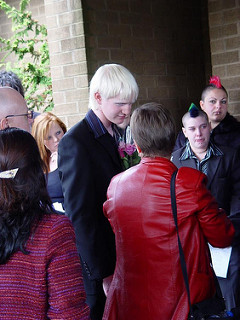
Adults have a lot to offer teens by way of experience, so we expect teens to learn from us. And yet there are times when adults can learn from them.
When a teenager dies, it’s often a teen’s first experience with death. Teens grieve for their peers differently than adults and some of their practices are healthy. Here’s what adults can learn from teens:
1. Teens grieve in groups. They congregate together during the funeral and afterwards. They huddle together in circles and grieve in a communal manner. They frequently comfort each other by hugging.
2. Teens grieve openly and don’t try to put on a face. They’re not embarrassed to cry.
3. Teens are the memory keepers and they share their stories. No matter what the relationship, whether friend, classmate, intimate, or acquaintance, they will dredge up every contact, every shared experience, and reminisce.
4. A teen funeral attracts hundreds of teens; everyone turns out even if they hardly knew the teen or the teen was an acquaintance.
5. Teens can overwhelm the bereaved family, wanting to hang out at the teen’s home so they can comfort the family and feel close to the teen that has died.
6. Teens use online forums, such as Facebook, to express their grief. Months and years later, they continue to post and share their feelings and memories.
So how can adults grieve more like teens? We adults can show our support for the bereaved and all turn out for the funeral, whether it’s a neighbor, colleague, congregational member, former teacher, or a community member. We can grieve more openly, not being afraid to shed our tears in front of others. We can look after each other, grieve in groups so we share our loss, and comfort each other so no one has to feel alone in their grief. We too can be memory keepers, searching for encounters and stories and sharing them with the bereaved family and our peers so we don’t forget. While we don’t want to overwhelm the bereaved family, we can visit, keep them company, listen, comfort them, and share their loss. We can use a forum (online or off) to express our grief, perhaps even notes, letters, and emails to the bereaved to let them know we remember their loved one and they’re not forgotten.
While teens will continue to learn from us, if we’re open to new perspectives, there’s a lot we adults can learn from them.
Robbie Miller Kaplan is an author who writes from a unique perspective as a mother who has lost two children. She has written How to Say It When You Don't Know What to Say, a guide to help readers communicate effectively when those they care about experience loss, available in ebooks for "Illness & Death," "Suicide," "Miscarriage," "Death of a Child," "Death of a Stillborn or Newborn Baby," "Pet Loss," "Caregiver Responsibilities," "Divorce" and "Job Loss." All titles are in Amazon's Kindle Store.
Copyright Legacy.com. Used with permission.
photo credit: <a href="http://www.flickr.com/photos/23139351@N00/148589723">DSC09708</a> via <a href="http://photopin.com">photopin</a> <a href="https://creativecommons.org/licenses/by-sa/2.0/">(license)</a>
 RSS Feed
RSS Feed
